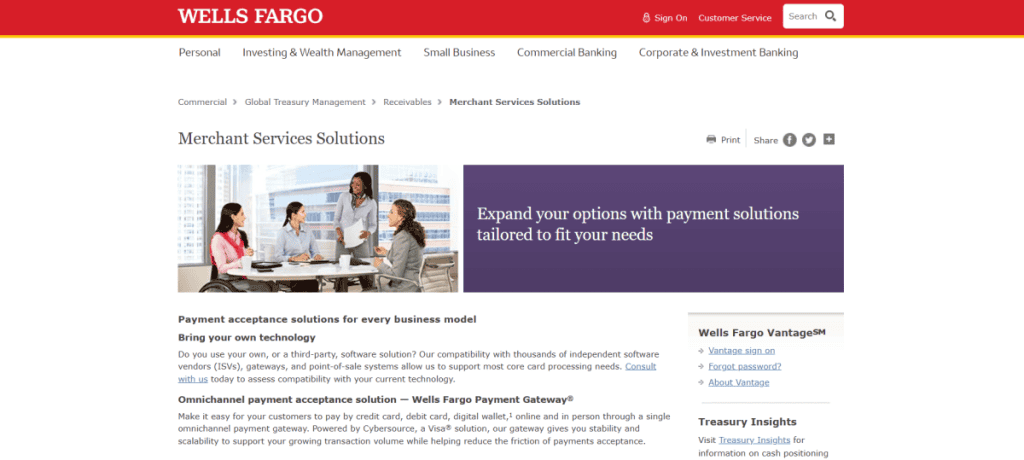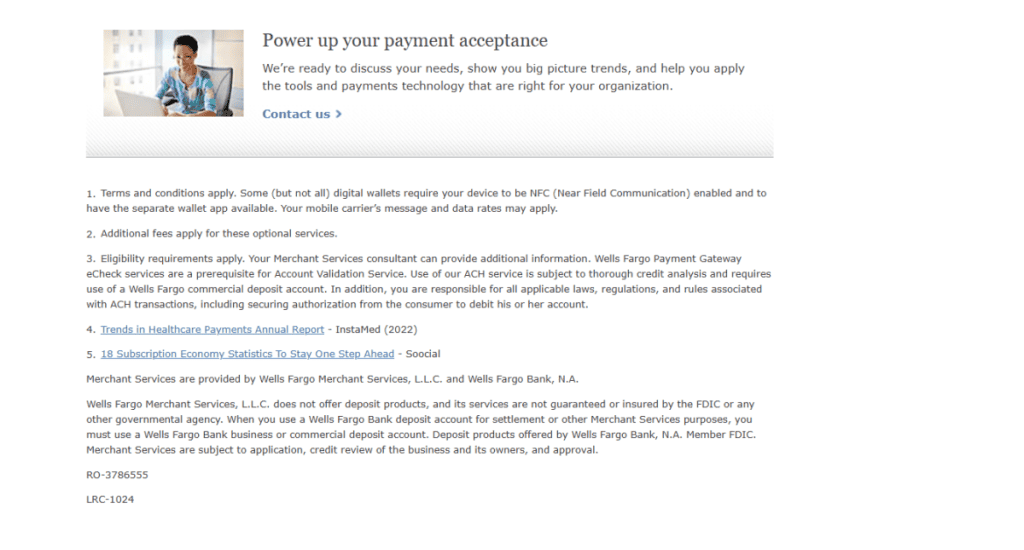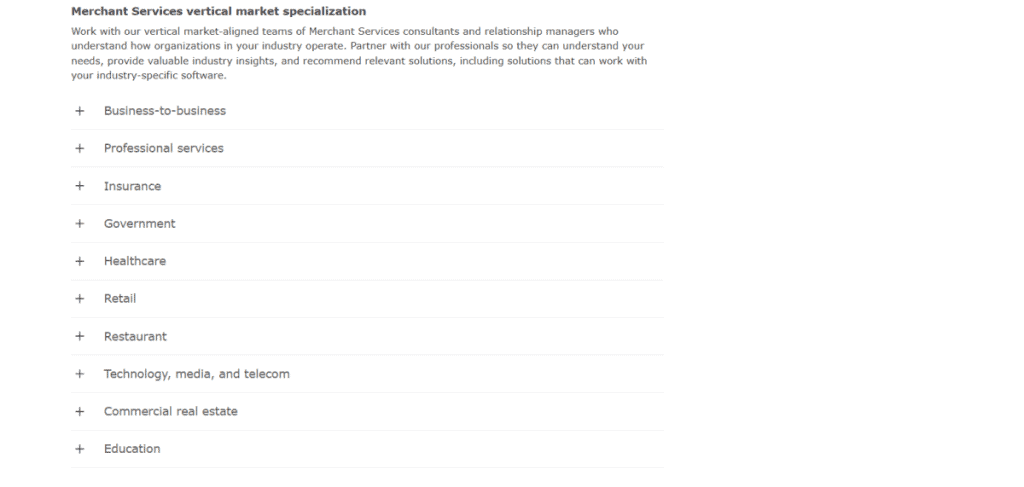
Wells Fargo Merchant Services Review
- 25th Oct, 2024
- | By Linda Mae
- | Reviews
One of the biggest and most established financial institutions in the U.S., Wells Fargo offers a variety of financial services such as banking, loans, and investment products. Established in 1852, the bank has expanded into a worldwide giant with trillions in assets, catering to millions of individuals and businesses. One of the services it provides is Wells Fargo Merchant Services, offering solutions for businesses seeking to accept various payments, whether in person or online. Let’s delve deeper into the Wells Fargo Merchant Services Review.
Wells Fargo Merchant Services provides payment processing for credit cards, debit cards, and mobile wallets, specifically designed for small and medium-sized businesses. Wells Fargo enables businesses to smoothly manage their transactions and customer interactions by integrating their payment solutions with point-of-sale (POS) systems. The Merchant Services department collaborates with Fiserv, a leading payment processor, for backend processing, ensuring their service is strong and protected.
This service is particularly beneficial for small to medium-sized businesses, including retailers, restaurants, healthcare providers, and service-based industries. Its offerings are designed to support businesses with a need for reliable, secure, and efficient payment processing. With solutions for both in-person and online transactions, Wells Fargo helps businesses improve their cash flow and optimize payment acceptance.
The platform offers resources for companies to monitor payments, create reports, and examine patterns, enabling improved financial supervision. Businesses that have Wells Fargo business accounts can access funds as early as the following business day, leading to a notable enhancement in cash flow management.
Key Features of Wells Fargo Merchant Services | Wells Fargo Merchant Services Review
Wells Fargo Merchant Services is designed to meet the needs of small and medium-sized businesses, offering a comprehensive suite of features that make payment processing easier and more efficient. The service supports businesses across various industries by integrating cutting-edge technology with robust security measures to ensure seamless operations.
Multi-Channel Payment Processing: One of the standout features of Wells Fargo Merchant Services is its ability to process payments across multiple channels. Whether a business operates in-store, online, or through mobile platforms, Wells Fargo’s solutions ensure a smooth transaction process. This multi-channel capability allows businesses to expand their sales reach and cater to customers wherever they are, whether in physical stores or digital spaces.
Support for Various Payment Methods: Wells Fargo Merchant Services accepts many payment methods, including traditional credit and debit cards and modern mobile wallets like Apple Pay, Google Pay, and Samsung Pay. This extensive assistance allows companies to provide flexibility to their clients, enhancing the customer experience and promoting customer loyalty.
Integration with POS Systems: The service integrates seamlessly with many point-of-sale (POS) systems, which is critical for businesses looking to streamline their operations. This compatibility allows businesses to process payments, manage sales, and monitor inventory all through one platform, making day-to-day operations more efficient.
Fraud Prevention and Security Tools: Security is a key concern for any business handling payments, and Wells Fargo addresses this with advanced fraud prevention tools and security protocols. The service is PCI-DSS compliant, ensuring that customer payment information is handled securely, and it offers robust encryption to protect sensitive data during transactions.
Compatibility with Accounting Software: In order to assist companies in managing precise financial documentation, Wells Fargo Merchant Services is designed to work seamlessly with common accounting software such as QuickBooks. This integration enables companies to automatically synchronize transaction information, decreasing manual input and reducing errors.
Payment Tracking and Reporting Tools: Wells Fargo provides detailed payment tracking and reporting tools that allow businesses to monitor their sales, analyze trends, and generate financial reports. These tools offer valuable insights that help businesses make informed decisions and manage their cash flow more effectively.
Pricing and Fees
Wells Fargo Merchant Services offers a range of pricing options, but its fee structure can be complex, depending on the business’s sales volume and the specific services needed. The costs include account setup fees, transaction fees, and recurring monthly charges, with some hidden fees that businesses should be aware of. Understanding the full fee structure is crucial for making an informed decision.
Account Setup Fees: Wells Fargo Merchant Services typically does not charge upfront account setup fees. However, depending on the type of hardware or software required, businesses may face costs when purchasing or leasing equipment, such as card readers or POS systems. This initial cost can vary depending on the type of solution chosen, such as Clover terminals, which come with a monthly fee.
Transaction Fees: Fees for transactions play a crucial role in Wells Fargo Merchant Services’ pricing model. Businesses usually have to pay a fee of 2.6% plus 15 cents for each transaction when handling in-person transactions, unless their monthly processing volume is below $15,000. The cost for internet purchases is slightly elevated at 3.4% in addition to 15 cents for each transaction. With the rise in monthly sales volume, there is a slight decrease in percentage, resulting in cost savings for larger transaction volumes.
Monthly Minimums and Recurring Costs: Wells Fargo Merchant Services charges a monthly service fee starting at $9.95 per location, depending on the POS solution in use. For e-commerce and virtual terminal solutions, businesses may also pay a higher monthly fee of $24.95. These recurring costs ensure access to services such as 24/7 customer support, reporting tools, and fraud monitoring.
Hidden Fees to Watch Out For: While Wells Fargo advertises certain fees upfront, businesses should be aware of additional charges such as PCI non-compliance fees, chargeback fees, and voice authorization fees. There may also be penalties for early termination if leasing hardware.
Fee Structure Comparison to Competitors: In comparison to Square or PayPal, Wells Fargo may have higher fees, especially for transactions made online. Rivals frequently provide pricing that is easier to understand, with fewer undisclosed charges. While Wells Fargo may provide more tailored services, smaller businesses with lower revenue may discover that competitors offer better value.
Hardware and Software Solutions
Wells Fargo Merchant Services provides businesses with a comprehensive range of hardware and software solutions designed to streamline payment processing. Whether your business operates in-store, online, or on the go, Wells Fargo offers robust tools to handle transactions securely and efficiently.
Available Hardware Options: Wells Fargo offers a variety of hardware options, including card readers, traditional countertop terminals, and mobile point-of-sale (POS) devices. The most common hardware solutions include Clover systems, such as Clover Flex and Clover Go, which support EMV (chip), NFC (contactless), and magnetic stripe transactions. These devices are portable, making them suitable for businesses with mobile operations, such as food trucks or market vendors. Businesses can purchase or lease the hardware, with lease terms often spanning multiple years.
Software Offerings: When it comes to software, Wells Fargo Merchant Services links up with Authorize.net for online business transactions, providing services such as recurring billing, online payment monitoring, and customizable reporting. Clover’s POS systems provide software that seamlessly integrates with inventory management, customer relationship management (CRM) tools, and accounting platforms such as QuickBooks, meeting the needs of businesses requiring more comprehensive management. This integration streamlines the company’s backend processes, making it simpler to oversee sales data and reconcile payments.
Customization Options for Businesses: The Clover POS system is highly customizable, allowing businesses to tailor the setup based on their needs. From adding apps to manage employee shifts to using advanced analytics for sales tracking, the software can be adjusted to suit various business operations. This flexibility makes it an appealing choice for businesses with specific requirements.
Ease of Use and User Interface Review: The user interface of the Clover system is intuitive and designed for ease of use. Both employees and managers can easily navigate the POS system, minimizing the learning curve. The software’s clear layout and touchscreen functionality contribute to an overall positive user experience, enabling businesses to handle transactions quickly and efficiently.
Reliability and Performance: Wells Fargo Merchant Services, supported by Fiserv for its processing, provides dependable performance through its hardware and software solutions. Businesses can depend on the system to handle large amounts of transactions efficiently with minimal disruptions and quick processing times. Moreover, Clover devices are recognized for their lasting quality and reliable operation, making them a trustworthy option for businesses of any size.
Payment Processing Speed and Reliability
Wells Fargo Merchant Services aims to provide businesses with reliable and fast payment processing solutions to ensure smooth operations. Speed and uptime are critical components of a good payment system, and Wells Fargo, leveraging its partnership with Fiserv for backend processing, focuses on delivering performance that meets the expectations of its customers.
Average Processing Time: The average processing time for transactions with Wells Fargo Merchant Services is relatively standard compared to other major providers. For most businesses, payments processed through Wells Fargo are typically settled within one to two business days, depending on the payment method and the merchant’s account setup. Businesses using Wells Fargo’s own business deposit accounts can often access funds by the next business day, which is beneficial for cash flow management. However, for larger or more complex transactions, processing can sometimes take up to three days.
Uptime and System Reliability Statistics: Wells Fargo Merchant Services provides reliable uptime, crucial for businesses to prevent interruptions while processing payments. The service is well known for its high uptime percentage, which guarantees that transactions can be processed without frequent outages or downtime. Powered by Fiserv’s infrastructure, the system is strong, experiencing few service interruptions. Although specific uptime data is not commonly shared, the platform is typically seen as dependable within the industry.
How Wells Fargo Handles Technical Issues: In the event of technical difficulties, Wells Fargo offers 24/7 customer support to help businesses resolve issues quickly. Whether through phone support, email, or online troubleshooting, businesses have access to a dedicated team that can assist with technical challenges, from system outages to hardware malfunctions. Wells Fargo’s commitment to providing round-the-clock support ensures that issues are addressed promptly, reducing downtime and preventing significant business disruptions.
Backup and Offline Payment Processing Options: For businesses that rely on constant connectivity, Wells Fargo Merchant Services provides backup options, such as offline payment processing, to ensure that transactions can still be captured even during internet outages. This feature allows businesses to accept card payments and process them once the connection is restored, minimizing the impact of system failures on sales and customer service. These options are particularly useful for retail and service-based businesses where real-time payment processing is crucial.
Security and Compliance
Security and compliance are critical aspects of Wells Fargo Merchant Services, designed to protect both businesses and their customers. With a range of security features and adherence to industry regulations, Wells Fargo ensures that sensitive payment data is handled securely and transactions are protected from fraud.
PCI-DSS Compliance and Encryption Standards: Wells Fargo Merchant Services is fully compliant with PCI-DSS (Payment Card Industry Data Security Standard), which is a mandatory requirement for all businesses that handle credit card transactions. This compliance ensures that businesses using Wells Fargo’s services meet the industry standards for securing payment data, reducing the risk of breaches. Additionally, Wells Fargo uses strong encryption protocols to safeguard transaction information during transmission, ensuring that customer data is protected from interception by unauthorized parties.
Fraud Detection and Prevention Features: To help businesses mitigate the risk of fraudulent transactions, Wells Fargo offers advanced fraud detection tools. These tools monitor transactions for suspicious activity and provide real-time alerts to merchants when potential fraud is detected. The system utilizes machine learning algorithms and other fraud detection methods to identify unusual patterns that may indicate fraudulent behavior. This proactive approach helps businesses prevent fraud before it impacts their operations.
Data Security Protocols: Wells Fargo enforces stringent data security measures to safeguard sensitive customer data. This set of protocols, which consist of encryption, tokenization, and secure storage practices, guarantee that cardholder information remains protected throughout the transaction process and beyond. The company’s systems are created to adhere to the strictest security standards, and routine audits are carried out to ensure compliance with ever-changing security regulations.
How Customer Data Is Handled and Stored: Wells Fargo ensures that customer data is stored securely and only accessed by authorized personnel. Sensitive payment information is not stored in its raw form; instead, it is encrypted or tokenized to prevent unauthorized access. This practice helps protect against data breaches and minimizes the risk of exposing sensitive customer details.
Chargeback Protection and Dispute Resolution: In addition to fraud prevention, Wells Fargo provides businesses with chargeback protection services. When a chargeback occurs, Wells Fargo assists businesses in managing the dispute by providing detailed transaction data and support during the resolution process. This helps businesses defend against unjustified chargebacks and minimize financial losses. Wells Fargo’s support team is available to guide merchants through the necessary steps to resolve disputes efficiently.
Customer Support
Wells Fargo Merchant Services emphasizes reliable customer support to assist businesses in managing their payment processing systems effectively. As payment processing is a critical function for businesses, having access to prompt and knowledgeable customer service is essential for addressing issues and maintaining smooth operations.
Types of Support Offered: Wells Fargo provides multiple channels for customer support, including phone support, email assistance, and live chat. Phone support is the primary method for resolving urgent issues, and businesses can also access help through email for less immediate concerns. Additionally, a detailed online resource center offers self-help guides and FAQs for merchants who prefer finding solutions independently.
Availability: One of the advantages of Wells Fargo Merchant Services is its 24/7 customer support availability. This ensures that businesses can get assistance any time they face technical issues or need help with payment-related concerns. Around-the-clock support is especially important for businesses that operate outside of traditional working hours or on weekends, such as restaurants or retail stores with extended hours.
Responsiveness and Quality of Customer Service: Although Wells Fargo provides a variety of help options, customers have differing opinions on the effectiveness and quality of its service. Some companies have mentioned receiving quick and useful assistance, while others have experienced challenges and long wait times when dealing with complicated problems. Businesses that have simple requests or minor technical issues often find solutions quickly. On the other hand, issues that are more complex, like disagreements or account-related matters, may require a longer period of time to resolve.
Support During Technical Issues and Disputes: When technical issues arise, such as payment system outages or hardware malfunctions, Wells Fargo provides dedicated support to resolve the problem as quickly as possible. Their technical support team is trained to troubleshoot issues related to POS systems, payment terminals, and software integration. In the event of disputes, such as chargebacks or transaction discrepancies, Wells Fargo offers detailed assistance to guide businesses through the dispute resolution process. This includes providing the necessary documentation and advice to help businesses protect their financial interests during the resolution.
Pros of Wells Fargo Merchant Services
Wells Fargo Merchant Services offers several advantages that make it an attractive option for many businesses, especially those looking for reliable payment processing from a well-established financial institution. Here are some key pros of using Wells Fargo Merchant Services.
Competitive Pricing Structure: Wells Fargo provides businesses with a range of pricing options based on transaction volumes and service needs. For small businesses, the flat-rate pricing structure is competitive, offering affordable transaction rates for both in-person and online transactions. Additionally, businesses with higher processing volumes can benefit from discounted rates, making the service cost-effective for larger enterprises. This tiered structure helps businesses of various sizes manage their payment processing costs more effectively.
Wide Range of Payment Options Supported: One of the major advantages of Wells Fargo Merchant Services is its ability to accommodate a diverse range of payment methods. Businesses have the option to receive payments via credit cards, debit cards, and mobile wallets like Apple Pay, Google Pay, and Samsung Pay. This level of flexibility allows customers to select their preferred payment option, resulting in increased sales potential and an enhanced customer experience overall.
Comprehensive Security Features: Wells Fargo takes security seriously, offering robust protection for businesses. The platform is PCI-DSS compliant, ensuring that all transactions meet industry security standards. Additionally, businesses can benefit from advanced fraud detection and prevention tools, which help monitor transactions for suspicious activity. The use of encryption and tokenization also ensures that sensitive customer data is safeguarded during the transaction process, providing peace of mind to both merchants and their customers.
Strong Customer Support Reputation: While customer service experiences can vary, Wells Fargo Merchant Services is known for its 24/7 customer support, which is particularly helpful for businesses operating outside standard business hours. Whether dealing with technical issues or payment disputes, businesses have access to a dedicated support team, ensuring that issues are resolved quickly.
Reliable and Easy-to-Use Hardware: Wells Fargo offers businesses dependable hardware choices, such as Clover terminals, which are recognized for their robustness and user-friendly design. These devices are capable of accommodating a variety of transactions such as EMV, NFC, and magnetic stripe, allowing businesses to efficiently handle payments. The Clover systems’ easy-to-use interface also reduces the learning curve, enabling staff to process transactions efficiently and seamlessly.
Cons of Wells Fargo Merchant Services
While Wells Fargo Merchant Services offers several advantages, there are some downsides that businesses should consider before committing to their services. Below are some key drawbacks to keep in mind when evaluating the platform.
Potential Hidden Fees: One of the main concerns reported by businesses using Wells Fargo Merchant Services is the presence of hidden fees. While the company advertises certain fees upfront, additional charges such as PCI non-compliance fees, chargeback fees, and voice authorization fees can catch businesses off guard. These extra fees can add up, making it difficult for businesses, especially small ones, to predict their monthly expenses. Businesses should carefully review the contract to ensure they understand all potential costs involved.
Limited Flexibility for Small Businesses: The pricing structure and service offerings of Wells Fargo Merchant Services are more appropriate for mid-sized to large companies. Small businesses with reduced transaction volumes might discover that the fees and pricing structures are less adaptable or cost-effective compared to other payment processors such as Square or Stripe. Furthermore, small enterprises may encounter difficulties due to the absence of clear pricing options, which can hinder their ability to locate a cost-efficient solution that fits their specific requirements.
Long-Term Contract Commitment Concerns: Another disadvantage is the long-term contract commitments required by Wells Fargo Merchant Services, particularly if businesses choose to lease hardware. Although the company has made efforts to eliminate certain long-term contracts for its basic merchant services, businesses that lease equipment often face three- to four-year commitments. These contracts can be difficult to break, especially for small businesses that may not need such long-term arrangements or find themselves needing to switch providers.
Fees for Early Termination: For businesses that do wish to end their contract early, termination fees can apply, particularly for hardware leases. These early termination fees can be substantial and act as a deterrent for businesses that want to switch to another payment processor. This lack of flexibility can be a significant drawback, especially for businesses that may outgrow their current service or find a better option elsewhere.
Comparison with Other Merchant Service Providers
When comparing Wells Fargo Merchant Services to competitors like Square, PayPal, and Chase Merchant Services, it’s important to evaluate each provider’s strengths and weaknesses based on pricing, service offerings, and overall usability. Wells Fargo competes well in certain areas but falls short in others, depending on the needs of the business.
Wells Fargo vs. Square: Square is a popular choice for small businesses due to its transparent pricing and lack of long-term contracts. Square charges a flat rate of 2.6% plus 10 cents for in-person transactions, which is generally lower and simpler than Wells Fargo’s pricing structure, which can include additional hidden fees. Square also provides a wide range of easy-to-use hardware options and does not charge for software or account setup, making it more attractive for smaller businesses with limited budgets.
However, Wells Fargo Merchant Services excels when it comes to offering customized solutions for larger businesses with higher transaction volumes. Wells Fargo provides more advanced fraud protection, security measures, and tailored solutions that may be more suitable for enterprises that require robust processing capabilities.
Wells Fargo vs. PayPal: PayPal has a solid reputation in online payments and e-commerce, with straightforward pricing for online transactions set at 2.9% plus 30 cents. This makes PayPal a perfect choice for companies that mainly work online or handle global transactions. On the other hand, Wells Fargo provides a wider range of in-person payment options thanks to its collaborations with Clover and Fiserv. Wells Fargo’s infrastructure is more appropriate for businesses requiring multiple payment channels, such as brick-and-mortar stores and mobile POS systems.
Wells Fargo also outperforms PayPal in terms of account management tools and customer service for brick-and-mortar businesses, whereas PayPal’s customer support is often cited as slow and limited.
Wells Fargo vs. Chase Merchant Services: Chase Merchant Services is a close competitor to Wells Fargo, as both are well-established banks offering a variety of payment processing solutions. Chase tends to offer lower transaction fees, especially for larger businesses, and includes benefits like same-day deposits for Chase banking customers. Chase also provides a more user-friendly interface and better integration with small business banking services.
However, Wells Fargo has an edge with its security features and customizable options for more complex business needs. For businesses already using Wells Fargo for banking, the seamless integration with merchant services can also be a big advantage.
Strengths and Weaknesses of Wells Fargo: Wells Fargo Merchant Services excels in its security protocols, various support options, and capacity to offer tailored payment processing solutions for bigger companies. Nevertheless, the platform’s increased fees, possible undisclosed expenses, and obligatory long-term contracts might be disadvantages, especially for small businesses. In contrast to Square and PayPal, Wells Fargo is more suitable for established businesses requiring advanced tools and services, although it may not be the ideal choice for those in search of basic, affordable solutions.
Conclusion
Wells Fargo Merchant Services is perfect for big businesses that need strong payment solutions, security features, and support across various channels. Nevertheless, small businesses that have lower levels of transactions might discover greater affordability with alternatives such as Square or PayPal. When looking for lasting benefits, Wells Fargo provides personalized options, although potential worries may arise from undisclosed charges and agreements.
FAQs
What payment methods does Wells Fargo Merchant Services support?
Wells Fargo supports a wide range of payment methods, including credit cards, debit cards, and mobile wallets such as Apple Pay, Google Pay, and Samsung Pay, ensuring flexibility for both businesses and customers.
Are there any hidden fees with Wells Fargo Merchant Services?
Yes, Wells Fargo may have hidden fees, including PCI non-compliance fees, chargeback fees, and early termination fees. To avoid them, businesses should thoroughly review their contract and maintain PCI compliance.
How secure is Wells Fargo Merchant Services?
Wells Fargo offers strong security measures, including PCI-DSS compliance, encryption protocols, and advanced fraud detection tools to protect sensitive transaction data.



